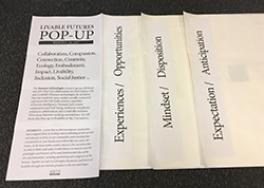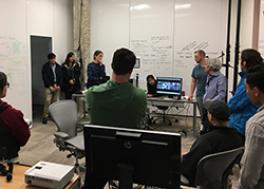Humane Technologies | Discovery Theme
Summary
A $130,000 Grant was awarded to PI Norah Zuniga-Shaw (Dance/ACCAD) to explore themes related to "Humane Technology"


New research is under way at ACCAD, focused on bettering the future through humane technologies. With a special grant from the Humanities and Arts Discovery themes initiative, ACCAD is bringing together artists, humanists and scientists to explore what it might be like to work, to play, to share and to think in more dynamic technological mediums that access our full multisensory human capacities.
The week of March 6-10, 2017 was dedicated to a "Livable Futures" residency. See Humane Tech Blog and Humane Technologies at OSU.
ACCAD’s project joins 11 other competitive proposals to receive first round Discovery Theme funding. Awarded $130,000 for 2 years, Collaboration for Humane Technologies symbolizes a significant investment by our College in this signature area of study. The funding unites a strong cross-disciplinary and intellectual community of scholars and students who will work collaboratively at ACCAD.
Principal investigator Norah Zuniga Shaw (Dance/ACCAD) is working closely with lead collaborators Peter Chan (Design), Alan Price (Design/ACCAD), Scott Swearingen (Design),Isla Hansen (Art/ACCAD), Alex Oliszewski (Theater/ACCAD) and Scott Denison (Design) to involve an even larger group of contributing faculty and students in this artist-driven collaborative research. And the project is drawing on the full range of advanced computing resources and facilities at ACCAD.
The group is currently investigating advances in augmented reality computing, virtual reality (VR) and 360? cinema and their potential. These technologies offer more compelling and effective interfaces for embodied interaction. Zuniga-Shaw explains “our working definition of humane technologies foregrounds bodily awareness, meaningful social exchange and creative exploration. With recent advances in virtual reality and augmented reality there is a renewed sense of possibility. Given the limits of traditional screen-based cinematic approaches for immersive and open environments, we are drawing on live performance and installation arts expertise.”
Using a “doing thinking” process they are calling “Sandboxes”, collaborators are asking how knowledge in the performing arts be extended and re-purposed to enhance embodied creativity in virtual spaces and what for? What are the ethical, philosophical and narrative contexts, potentials and pitfalls? And as we always ask at ACCAD, what advances can be made by asking these questions in an interdisciplinary context and through collaborative making and thinking practices?
Perhaps more than anything else, collaboration and expanding faculty and student expertise in collaboration is what this project and others at ACCAD are all about. Founded as a center for art and science research in the age of early computer graphics, ACCAD has established a national and international reputation for impactful research that is the direct result of successful models for collaboration. At the core of our work is our emphasis on the practices that are intrinsic to the arts and design and on devising novel modes of translating, visualizing and activating those practices for research, discovery and uptake in other fields. At the heart of this project is the understanding that research and education in the 21st century requires not only deep investment in our core competencies and the emphasis on creativity and critical thinking that have long been strengths of the arts and humanities; but also an increased emphasis on collaboration, digital and global literacy, and student-centered learning that is enhanced through engagement in research.
